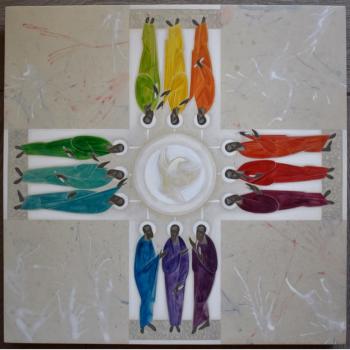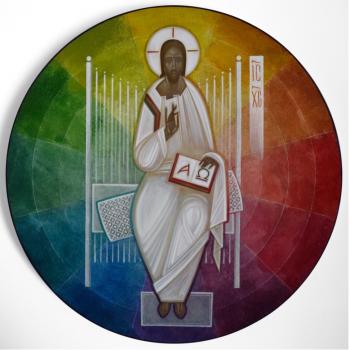
Part 1. Framing the Discussion
This series of posts exploring the question “Should all Christians become vegetarians?” is born out of a recent seminar I taught. My argument is a work in progress and I’d appreciate helpful feedback/pushback. For full-disclose, I describe myself as pescetarianish (I’ll explain more about what that means in due course).
In Part 1, I want to begin to lay the foundation for why this question is one that Christians, particularly American Christians, ought to take seriously.
Framing Questions
Before we can answer the specific question, “Should all Christians become vegetarians?”, it’s important to take a few steps back and ask more meta, foundational questions. These bigger, broader questions frame our more specific one and place it in the appropriate narrative context.
As we consider whether all Christians should become vegetarians, we first need to answer these questions that help locate us in the story in which we find ourselves: Who is God? Why did God create the world? What are humans for? What is Christianity about?
Vertical + Horizontal Dimensions
We’ll start with the last question first. Christianity is “about” a lot of things, perhaps best summarized by the Lordship of Jesus Christ over all creation. One error I want to address is the notion that Christianity is only about (or primarily about) a “personal relationship with God” that “gets you into heaven.” Christianity is about far more than this impoverished view. Christianity has vertical and horizontal dimensions. The Lordship of Jesus Christ leaves no corner of existence unchanged. Consequently, being a Christian – faithfully living under the Lordship of Jesus Christ – effects every sphere of our existence. This is highlighted in Romans 12:1-2.
After Paul develops the complex theological argument(s) of Romans 1-11, his emphasis switches to a more ethical focus in Romans 12-16 (I’m painting in broad brushstrokes here). Paul writes:
Here comes the “so what?”: As a result of everything I’ve just written, I exhort you, brothers and sisters, empowered by the mercies of God, to offer your entire lives, in every sphere of life, as a living sacrifice, holy and pleasing to God – this is the true and fitting way to worship Him who has done so much for you. Do not continue on a trajectory of being conformed to the patterns of this present age, but be transformed more and more by the renewing of your minds, so that you can discern and approve what the will of God is – that which is good, and pleasing and perfect. (Romans 12:1-2, my translation)
I want to highlight two things about this hinge passage. First, Paul is exhorting Christians to submit every sphere of life to God. Nothing is outside of the reign of King Jesus. Everything we are, everything we have, everything we do is to be offered to God in response to what God has mercifully offered to us in Jesus. Second, Paul exhorts Christians to no longer go along with the ways of the world in terms of how they think, feel, and act. Instead, Christians are to be transformed by the renewing of their minds. As NT Wright translates it in Paul for Everyone: Romans: we are not to let ourselves “be squeezed into the shape dictated by the present age.” In other words, we are to reconsider our patterns of thought and behavior in order that we might live in greater conformity with how God intends us to live under the Lordship of Jesus Christ.
The ethical matrix of Christianity
This leads to us to consider the ethical implications of the Christian faith, what I’m calling the “ethical matrix” of Christianity. The Oxford English Dictionary provides two helpful, complementary definitions for “matrix”:
A place or medium in which something is originated, produced, or developed; the environment in which a particular activity or process begins; a point of origin and growth.
The elements which make up a particular system, regarded as an interconnecting network. Frequently with distinguishing word, as political matrix, social matrix, etc.
When I talk about the ethical matrix of Christianity, I am integrating both of these working definitions. The vertical dynamic of saving faith in Jesus is what transfers a person from death to life, from the old age into the new age, from the kingdom of darkness to the kingdom of light. This is where the process of a life lived under the Lordship of Jesus begins. But it does not end there. This vertical dimension necessarily develops outward into the horizontal dynamics. Christians reconciled to God in Christ in order to be reconciling ambassadors to the world, actively involved in the project of new creation. How we make sense of what is required in this process and what we are called to is through the ethical system (e.g. how we are to live as resident aliens) of Christianity. Another way of saying this is the ethical matrix of Christianity incorporates two central dynamics of the faith that are unfortunately often separated. I’ll call them “personal salvation” and “social justice.”
A Fuller and Deeper Conversion
Having laid the foundation, we can switch gears and begin addressing the specific topic at hand: the implications of Christianity on our habits of consumption. In Laudato Si, Pope Francis addresses a very related issue, ecological justice, and called for a fuller and deeper conversion. I think he’s right. In order to get here and see the relevance of this what is required is a fuller and deeper conversion.
For this reason, the ecological crisis is also a summons to profound interior conversion. It must be said that some committed and prayerful Christians, with the excuse of realism and pragmatism, tend to ridicule expressions of concern for the environment. Others are passive; they choose not to change their habits and thus become inconsistent. So what they all need is an “ecological conversion”, whereby the effects of their encounter with Jesus Christ become evident in their relationship with the world around them. Living our vocation to be protectors of God’s handiwork is essential to a life of virtue; it is not an optional or a secondary aspect of our Christian experience. (#217)
One cannot talk about our food consumption without talking about ecology. And, I think many Christians approach questions about the types of food we ought to eat with the same suspicion, disregard, or ridicule as they do conversations about our very real ecological crises. Again, a Christian’s encounter with Jesus translates not merely into a personal piety but also into a public posture in the world that embodies God’s intentions for creation. This is simply to say, Christians are to faithfully live as the image of God in a fallen world.
Re-frame Issue: from choice to justice
To wrap up this section, I want to re-frame the topic of what we should eat and what should refrain from eating from an issue of personal choice to one of social justice.
Consumption is a justice issue. The reality is that the goods and services we buy has a powerful impact on our shared environment, on animals, and on our fellow humans. It’s fair to say our consumption patterns in the West, in general, and in America in particular, have had a negative impact (think: deforestation, oceanic dead zones; factory farming; and the manifold abuses of agricultural laborers).
If the food we consume (or don’t) is a justice issue, Christians ought to be forerunners in battling the injustices related to the food and agricultural industries. In Dr. Martin Luther King, Jr.’s remarkable “Letter from Birmingham Jail,” he writes a stunning line about the nature of injustice:
Injustice anywhere is a threat to justice everywhere. We are caught in an inescapable network of mutuality, tied in a single garment of destiny. Whatever affects one directly, affects all indirectly.
Dr. King is, of course, speaking about racial injustice in the letter. But if this powerful idea is true – and I think it is – it applies to every type of injustice. An injustice anywhere is a threat to justice everywhere. Consequently, Christians ought to care about every injustice in order to be salt and light in the world, actively engaged in God’s redemptive project of new creation. This is true for battling racial injustice. It’s also true of battling the dark underbelly of our consumerism.
—
As Alasdair MacIntyre famously put it in After Virtue: “I can only answer the question ‘What am I to do?’ if I can answer the prior question ‘Of what story or stories do I find myself a part.’”
In Part 2, I will develop a Biblical Theology of Creation in order to further flesh out the story in which Christians find themselves a part as we make our way to thoughtfully answering the question, “Should all Christians become vegetarian?”















